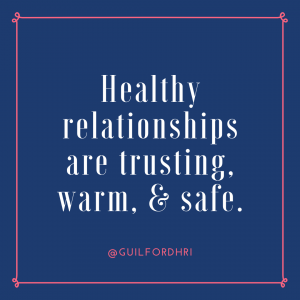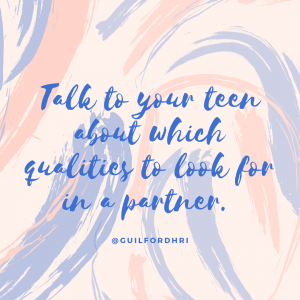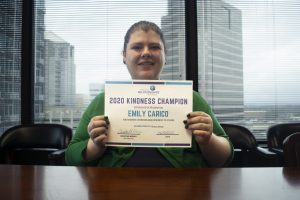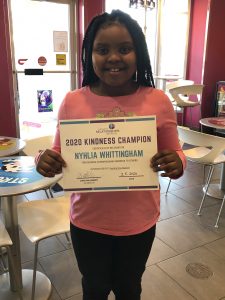
Healthy relationships require trust, warmth, and safety!

Healthy relationships require trust, warmth, and safety!

“Let us always meet each other with a smile, for the smile is the beginning of love.” – Mother Teresa

Today’s Kindness Champion is Mat Burkett! This is what his nominator had to say about what makes him a kindness champion: “I’m nominating him because he is the perfect example of kindness! Always willing to lend a hand to someone else, greets everyone with a smile, only has nice things to say to others, gives freely of himself – his time, his resources, and his talents. All around great guy – at work, at home, and in the community.”
Today marks the last day of our 2020 Kindness Champions of Guilford County. We encourage you to continue to recognize individuals in your life and community for their kindness throughout the rest of this year!

By Eleanor Beeslaar, HRI Graduate Assistant
A big part of developing healthy dating relationships is knowing what to look for in a dating partner. Though attraction is an important part of dating, it’s also important to find someone who embodies the qualities of a healthy dating partner. When talking to your teen about dating, help them identify qualities to look for in a dating partner, such as trust and honesty! Be sure to give them space to communicate what they think are important qualities for a healthy dating partner throughout this conversation, as well.
We’ve provided some talking points to help you get started!
Qualities to Look for in a Dating Partner:
Today’s blog was adapted from information provided loveisrespect.org.
As we wrap up our Talking to Teens about Dating series, we hope you have learned some helpful tips to build your relationship with your teen as you help them navigate this new life stage!

The Healthy Relationships Initiative is partnering once again with Well·Spring Solutions to host relationship expert and renowned authors, Dr. Gary Chapman and Dr. Shannon Warden!
Dr. Gary Chapman (https://www.5lovelanguages.com/5-love-languages/) and Dr. Shannon Warden (https://www.shannonwarden.com) will share their insights and expertise on how caregivers can work to keep their relationship healthy when caring for a loved one with dementia. This event will feature a virtual discussion by the experts, followed by an opportunity for Q&A from the audience.

Today’s Kindness Champion is Joe Blosser! This is what his nominator had to say about what makes him a kindness champion: “Joe Blosser HPU (many titles) is an extraordinary humble public servant in High Point. He shares his love of our community with his skills, knowledge, and talents in so many different arenas…HPU, GCS, Greater High Point Food Alliance, Growing HP, Good Friends and on and on. One of God’s true treasures in HP.”

By Eleanor Beeslaar, HRI Graduate Assistant
Just like it’s important to talk to your teen about what healthy dating relationships look like, it’s also important to have a conversation about the different types of abuse and warning signs that indicate an unhealthy and/or abusive relationship. This can be a challenging conversation to have, so know that you are valid in any fears, apprehensions, or worries you may have. Though this can be a difficult conversation, it is also an important one. Being aware of the signs of unhealthy relationship behavior, can help teens prevent potentially abusive relationships!
In yesterday’s blog, we talked about the importance of letting your teen lead the conversation with what they already know when discussing healthy relationships. The same is true when talking about unhealthy relationship behavior and warning signs of abuse. Ask your teen what they already know and fill in the gaps as the conversation unfolds.
We’ve provided some questions and answers with important information to help you navigate this conversation with your teen!
What is an unhealthy relationship?
Unhealthy relationships are based on power and control and can leave you feeling sad, afraid, lonely, worried and unsafe. Though all unhealthy relationships are based on power and control, the behaviors and characteristics within these relationships may look very different. Abuse does not have a one size fits all definition and can take many forms, some of which are very subtle. Usually, the first thing that comes to mind when talking about dating violence or abuse is physical violence. Though this is a form of dating violence, there are many other ways that abuse can be present in relationships, including: emotional abuse, verbal abuse, sexual abuse, stalking, and even digital abuse.
What are the different types of relationship abuse and what do they look like?
What are the warning signs of abuse?
What are some resources to help teens with Teen Dating Violence?
Remember, relationship abuse is NEVER the victim’s fault. If your teen expresses that they or someone they know has experienced teen dating violence, believe them, support them, and be an ally as they begin their healing process.
The information in today’s blog series was adapted from our “What is an Unhealthy Relationship?” blog. Be sure to check it out for more information!

Today’s Kindness Champion is Emily Carico! This is what her nominator had to say about why she is an outstanding example of kindness in our community: “She is an attorney with Legal Aid. She is the lead attorney at the FJC in High Point. She treats every victim of violence with kindness. She takes her time with clients and makes sure that people understand their cases. She is also someone that the partners can go to in order to get more information about the law. She never is irritated, but rather helpful and full of knowledge.”

By Eleanor Beeslaar, HRI Graduate Assistant
An important first step when talking to your teen about dating is sharing what a healthy relationship looks like. Start an open conversation with your teen, asking them what qualities they think make up a healthy relationship. By letting them lead with what they already know, your teen is more likely to feel like this is a conversation instead of a one-sided lecture, increasing the likelihood that they will be engaged and buy into what is being discussed. Asking your teen for their opinions, experiences, and input will also help them feel heard and respected throughout the conversation.
While listening to what your teen has to say about healthy relationships, be an active listener and focus on their strengths. Being an active listener means asking questions when you don’t understand something, reflecting back what you hear your teen saying, and validating the healthy relationship qualities they point out. When you use active listening skills and hone in on your teens strengths, they will feel validated, heard, and respected throughout your conversation.
After hearing from your teen about what they think a healthy relationship looks like, we encourage you to share some healthy relationship qualities that they might have missed or may need more information about. We’ve provided some key healthy relationship qualities to help you guide the conversation:
This is a lot of information to cover, so it’s important to be mindful about not overwhelming your teen with too much at once. Start an open and ongoing conversation about dating relationships, and let your teen know that you are there for them whenever they have any questions or concerns!

Today’s Kindness Champion is Nyhlia Whittingham! Here is what Nyhlia’s nominator had to say about what makes her a kindness champion: “Nyhlia is an incredible 5th grader. She always does the right thing, even when no one is looking. She embodies kindness in her daily interactions with other kids and with adults. If someone needs help, she is one of the first to offer assistance. If someone is upset, she is one of the first to comfort. On many times, I’ve seen Nyhlia stand up for what she thought was right, even if it meant disagreeing with her friends – something that most fifth graders are not ready to do. She’s often the first to stand up for someone who is being mistreated, and one of the first to invite someone to join her if they are alone. Nyhlia is mature, intelligent, and a pleasure to be around. She is an all-around great kid and it’s a pleasure to know her and watch her grow. More kids should be like Nyhlia!”